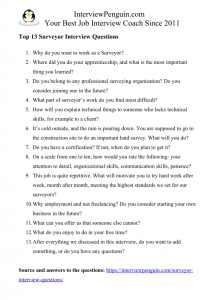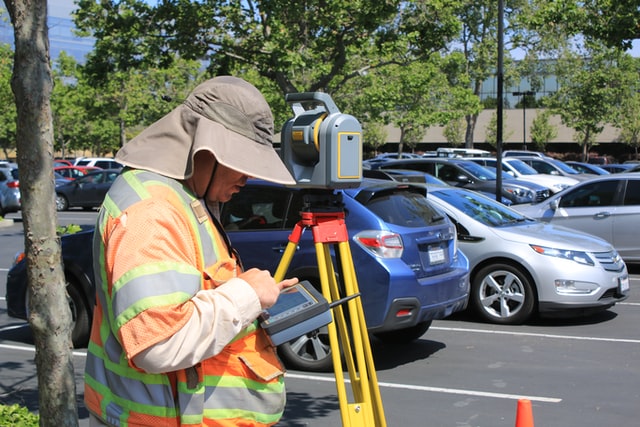Everyone dreams of owning a piece of land, and perhaps a nice house pitched on it. But our Earth is not infinite–perhaps not even ours, considering what we do to Her. Anyway, someone has to measure the land features, the depth and shape, the angles and sizes. And that will exactly be your daily bread in a job of a Surveyor–if you manage to get it, of course.
You will measure land features, based on reference points. Then you will compare your data with previous land records, prepare maps and reports, and present them to clients. Clients need them to proceed with their building projects, and at the end of the day that’s the reason why your job exists.
Let’s have a look at the questions you may face, and how you should answer them to make a great impression on your interviewers.
Table of Contents
Why do you want to work as a Surveyor?
You should not say that you want to work as a land Surveyor because you have degree in Civil Engineering, and earned a Surveyor certificate. It would indicate a must, and you would turn the chain of cause and effect upside down. You actually studied Civil Engineering in order to be able to get the certificate, and later the job… But what to refer to then?
You can say that you want to work as a Surveyor because you enjoy the job greatly. What’s more, you understand the importance of your work–construction works can hardly move forward without you input. No dangers loom in the future for this profession also–it is a safe and well paid job. Basically an ideal choice for your skills, personality, and preferences, and eventually also for your education…
Where did you do your apprenticeship, and what is the most important thing you learned?
You typically have to do an apprenticeship in order to get a certificate and later your first job (though conditions vary in different countries). This is an important start to your professional career, and you should try to ensure your interviewers that it prepared you for the job.
You can refer to a variety of things here. One of them is working with specialized software, such as AutoCAD or QuikGrid, or getting some real experience with translating the results of your work to maps and plans, and eventually to documents clients need to get a building approval, or to basically start some construction work.
Another alternative is referring to to some abilities and skills you learned or honed during your apprenticeship. Perhaps you improved your attention to detail and precision, shadowing an experienced colleague. Or, observing the way they talked with the clients, you eventually improved your communication skills…
One way or another, try to speak with enthusiasm about your apprenticeship, and ensure the hiring managers that you feel ready to handle the job now.
Do you belong to any professional surveying organization? Do you consider joining one in the future?
This question is a little bit tricky. Because you would join an organization as an individual surveyor especially if you wanted to freelance. But you gain also other benefits from your membership, such as access to studies and new research in the field, and sometimes also entry to trade conferences, and other events that can help you become better in your profession. Of course this isn’t true for each organization, but definitely applies to many of them around the globe.
If you are not a member, I suggest you to say the following: You are not a member yet, because you do not consider freelancing as an option for your career. At the same time, however, you’ll be glad if their company applies for a firm membership. In such a case you will join as a member of their team, clearly knowing where you belong, and at the same time get access to educational materials, and other benefits resulting from the membership.
If you are a member, you should point out the benefits you get from the membership, and perhaps also the reason why you joined without having intentions to work as a freelancer.
What part of surveyor’s work do you find most difficult?
Is it conducting surveys, working with certain tools, building maps and charts, or perhaps the communication with the clients, and facing their objections?
Each of us has some favorite and less favorite duties in their job. The most important thing is to ensure the interviewers that you understand the importance of all tasks, including the communication with the client.
Maybe you struggle with this or that, you are new in the field after all. You haven’t got much experience up to this point. But you are aware of your weaknesses, and want to improve on them, to eventually become an excellent land surveyor. Hiring managers seek this attitude in good job applicants.
Nobody is perfect, and nobody ever will be. But it is an honest pursuit of perfection that matters, and that distinguishes an excellent employee from the rest of the pack.
How will you explain technical things to someone who lacks technical skills, for example to a client?
Ensure them that getting your message over is your first priority. In fact, client does not have to understand all technical details–it is not important for them. But when they ask about this or that thing, you should be able to explain it to them.
Say that you plan to use demonstration, comparisons, and practical illustrations, to show the client what they want to see. You will try to limit the number of technical terms in your speech. You will adjust your communication to the intellectual abilities and knowledge of your audience, to ensure they get the message.
Another alternative is emphasizing patience. At the end of the day, clients pay for your work–and they should understand what they are paying for. Hence you won’t just quickly tell them what you want to say. You will ask them questions, repeatedly ensuring that they understand what you are telling them, and that they are happy about the communication with you.
It’s cold outside, and the rain is pouring down. You are supposed to go to the construction site to do an important land survey. What will you do?
This is a tricky question, because normally surveyors do not work in heavy rain or snow. It impacts visibility and can result in incorrect results of your work. This is the first thing you should address in your answer, but not the last one.
Rain rarely pours down the entire day. And if it is an important measurement, you should not simply give up, or delay it, in your already busy schedule. Try to show some flexibility. You can say that you will study the weather forecast in detail, for the given city or even exact location.
Looking for a window of good weather, or at least a window of lighter rain, you will try to make arrangements with the client and eventually travel to the construction site on the given day.
And when it comes to your comfort, you do not care whether it is hot or cold outside, whether the sun shines or rain falls from the skies. You will simply put on appropriate clothes, and head outside to do your job…
Some other questions you may face in your land surveyor job interview
- Do you have a certification? If not, when do you plan to get it?
- On a scale from one to ten, how would you rate the following: your attention to detail, organizational skills, communication skills, patience?
- This job is quite repetitive. What will motivate you to try hard week after week, month after month, meeting the highest standards we set for our surveyors?
- Why employment and not freelancing? Do you consider starting your own business in the future?
- What can you offer us that someone else cannot?
- What do you enjoy to do in your free time?
- After everything we discussed in this interview, do you want to add something, or do you have any questions?
* You can download the list of questions in a one page long PDF, and practice your interview answers anytime later, even when offline:

Conclusion, next steps
Interview for a job of a surveyor belongs to easier job interviews. It is quite easy to predict the questions they will ask you (and you can prepare your answers in advance). What’s more, degree and certification is pivotal for your success. If you have them, they have no reason to doubt your professional capabilities. Hence you typically won’t face any particularly technical questions.
Try to learn something about your future employer–what clients they have, typical places of work, how many surveyors work for them already, etc. This will help you to demonstrate real interest for the job, and also to connect with the hiring managers–which is important in every interview.
I hope you will succeed, and wish you good luck!
May also interest you:
- Building Inspector interview questions.
- Estimator interview questions.
- 15 most common interview questions and answers – What are your weaknesses? Why should we hire you? What motivates you? Learn how to answer some common interview questions that you can face while trying to get any job, at any place.

